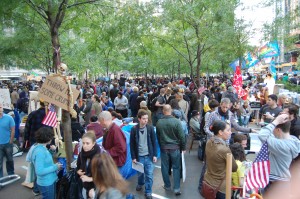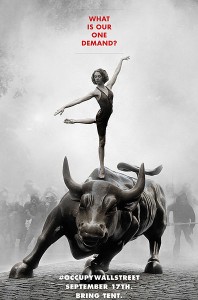Democracy
President Obama said he’d make a decision on the Keystone pipeline after the election.
The decision to not decide until later was a victory for environmental activists, as the pipeline would be a serious threat to the ecosystems it passes through should it spring a leak (TransCanada has already had 12 oil spills in 2011 alone. That’s 12 too many, by the way.)

Today is the Feast of Christ the King, the last Sunday in our church year.
I always find it a strange feast to celebrate in a democracy, in which the whole point is that we do not have kings, but shared authority vested in the people and temporarily delegated to elected leaders. What does thinking about Jesus as a King mean to folk like us?
This year it is particularly strange, for, with the exception of the marriage of William and Kate, this has been a bad year for kings. Monarchs, tyrants, plutocrats, and autocrats of every stripe have found themselves under assault from a powerful wave of populism, as the citizens of country after country have risen up to hold their leaders accountable for their stewardship of their nations. Throughout the Middle East and in parts of Europe and the United States, the official narrative of power has been held up and judged against another set of ideas, one that speaks of fairness, liberty, and raising up the poor. Ruler after ruler has heard a cry that translates, roughly: “as you did it to the least of us, so shall it be done to you.”
Christ is a different kind of king, and his authority always calls our leaders to account, whatever the form of our government or our political preferences. Christ embodies a form of leadership that is rarely seen in our world. In the ordinary scope of things, our leaders wear nice suits and inhabit the corridors of power and cut deals with the wealthy and the powerful. Christ, however, threw in his lot entirely with those whom the doors of power shut out. He would talk with anyone, eat with everyone, and, in the end, died among the refuse of his people. He was a leader who led from below.
One year of prison costs more than one year at Princeton. Capitalism and social justice. OpEd: The values discussion we're not having. 'One Day's Wages' fights poverty two years on. Government aid helped cut U.S. poverty nearly in half. Religion-friendly democracy and democracy-friendly religion. And Newt Gingrich says God forgave him.
Editor's Note: HuffPost Religion is running a series of posts by Sojourners' Director of Mobilizing Lisa Sharon Harper and D.C. Innes, her co-author on the new book, Left, Right and Christ: Evangelical Faith in Politics, about how Christians should view social issues. Their first issue is Occupy Wall Street.
From the official statement by #OccupyWallStreet: "As one people, united, we acknowledge the reality: that the future of the human race requires the cooperation of its members; that our system must protect our rights, and upon corruption of that system, it is up to the individuals to protect their own rights, and those of their neighbors; that a democratic government derives its just power from the people, but corporations do not seek consent to extract wealth from the people and the Earth; and that no true democracy is attainable when the process is determined by economic power."

In his column last week, Sojourners chief Jim Wallis talked about his frustration with the perennial misuse of the word "evangelical" by various media to describe folks and ideas that, in his view, and that of many of us who self-describe as evangelicals, don't bear any resemblance to what we understand that term to actually mean.
Below is a compilation of recent media reports where the word "evangelical" is invoked. When you read these, evangelical brothers and sisters, do you recognize yourself in how the word is used and defined? Or does it ring false to you and your understanding of what "evangelical" really and truly means?
Did anyone else get the feeling, as we watched weather reporters wave their arms frantically in swirling motions across oversized maps of the eastern seaboard -- with their eyes bulging as they pushed out whole paragraphs without a single breath for a period -- that this was all hype?
Last weekend, as Irene passed over town after town in the mid-Atlantic, memories of Katrina did not materialize. By the time Irene huffed over New York City on Sunday morning, and the flood of the century was actually just a really big puddle in Battery Park and a floating lifeguard stand in Long Beach, my fear had transformed into complacency. From there I became cynical. By Sunday afternoon I found myself watching the weatherman's bulging eyes as he repeated the mantra of the day: "It's not as bad as we thought it would be, but it's not over." And I thought: "Boy, they'll do anything for ratings."
But it wasn't all hype.
Could nonviolent resistance have succeeded in Libya? Here are four points worth considering:
1) The movement was fairly spontaneous, unlike the highly coordinated campaign in Egypt. As Peter Ackerman consistently points out, planning is an essential element to a successful nonviolent revolution. As with any battlefield, a nonviolent campaign requires extensive preparation. But reports seem to indicate that Libyans began protesting in earnest around Feburary 15th, likely inspired by events in neighboring Egypt and Tunisia. Gadhafi seemed prepared for this and immediately cracked down using overwhelming violence. By February 19th, the movement had become violent in response to these crackdowns. Four days of civil resistance doesn't give it much time to work. Egyptian pro-democracy activists struggled for years before seeing Mubarak fall. Syrian oppositionists, thousands of whom have been killed by Bashar al-Assad's regime, have toiled along for the past six months. So, we can't really say whether or not nonviolence would have worked in Libya. It never had a chance to materialize in the first place.
Broadcaster Tavis Smiley and Princeton professor Cornel West just wrapped up their 18-city "Poverty Tour." The aim of their trip, which traversed through Wisconsin, Detroit, Washington, D.C., and the Deep South was to "highlight the plight of the poor people of all races, colors, and creeds so they will not be forgotten, ignored, or rendered invisible." Although the trip has been met with a fair amount of criticism, the issue of poverty's invisibility in American media and politics is unmistakable. The community organizations working tirelessly to help America's poor deserve a great deal more attention than what is being given.
The main attack against the "Poverty Tour" is Smiley and West's criticism of Obama's weak efforts to tackle poverty. For me though, what I would have liked to see more is the collection of stories and experiences from the people West and Smiley met along their trip. The act of collective storytelling in and of itself can be an act of resistance.
More than 150 Roman Catholic priests in the United States have signed a statement in support of a fellow cleric Roy Bourgeois, who faces dismissal for participating in a ceremony ordaining a woman as a Catholic priest, in defiance of church teaching.
More than 300 priests and deacons in Austria -- representing 15 percent of Catholic clerics in that country -- last month issued a "Call to Disobedience," which stunned their bishops with a seven-point pledge that includes actively promoting priesthood for women and married men, and reciting a public prayer for "church reform" in every Mass.
We have come to an impasse in the negotiations to raise the debt ceiling because of several conceptual errors in our public discourse. These errors were most glaring in the remarks recently delivered by Speaker of the House John Boehner in his response to President Obama. The largest conceptual error is the idea that the government of a constitutional representative democracy is different from the people. Boehner said, "You know I've always believed the bigger the government, the smaller the people."
What does this mean? The government is composed of the people, and if people are paying attention and voting according to their own interests, the government ought to work toward the happiness of the people. The problem is that too many Americans have bought into this conceptual error that the government is some kind of leviathan, a monster that exists to take away their liberties. This is nonsense. A correction of another conceptual error in Boehner's presentation makes my point.

This comes after a Supreme Court decision in May that ordered California to reduce its prison population, as overcrowding was causing "needless suffering and death."
Part of what's making the standoff worse is the belief that the strike is, in essence, a form of gang activity. For one thing, as Colin Dayan noted in passing in a New York Times op-ed, "How they have managed to communicate with each other is anyone's guess." The California Department of Corrections and Rehabilitation (CDCR), though, isn't so stumped.
As I celebrated my freedom on Independence Day, I found myself considering the promise that my country boasts about: "liberty and justice for all." In particular I was struck by the many freedoms uniquely absent from the lives of so many American workers.
The scenes were stunning: Hundreds of demonstrators pouring across the fence between Syria and the Israeli occupied Golan Heights.
[Editors' note: This post was written in response to a question posed by The Washington Post's On Faith blog editors: Is it moral to celebrate a person's death, even i

